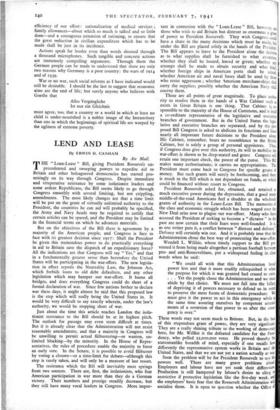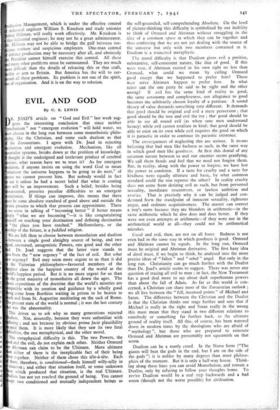LEND AND LEASE
By ERWIN D. CANHAM
By Air Mail.
THE " Loan-Lease " Bill, giving President Roosevelt un- precedented and sweeping powers to expedite aid to Britain and other beleaguered democracies has started pro- misingly on its way through Congress. Despite immediate and vituperative resistance by some isolationist leaders and some ardent Republicans, the Bill seems likely to go through Congress smoothly with several limiting, but not crippling, amendments. The most likely changes are that a time limit will be put on the grant of virtually unlimited authority to the President, the countries he can aid will probably be specified, the Army and Navy heads may be required to certify that certain articles can be spared, and the President may be limited in the financial terms on which he advances materials.
But on the objectives of the Bill there is agreement by a majority of the American people, and Congress is face to face with its greatest decision since 1917: Shall the President be given this tremendous power to do practically everything in aid to Britain save the dispatch of an expeditionary force? All the indications are that Congress will say " Yes," and that in a fundamentally greater sense than heretofore the United States will be participating in the war-effort. The new legisla- tion in effect repeals the Neutrality Law, the Johnson Act, which forbids loans to old debt defaulters, and any other legislation which may hamper our war-effort. It burns all bridges, and does everything Congress could do short of a formal declaration of war. Since few nations bother to declare war these days, it might almost be said that this proposed law is the step which will really bring the United States in. It would be very difficult to say exactly wherein, under the law's authority, we would be stopping short of war.
Just about the time this article reaches London the isola- tionist resistance to the Bill should be at its highest pitch. The outlook for passage may even seem difficult at times. But it is already clear that the Administration will not resist reasonable amendments, and that a majority in Congress will be unwilling to permit actual filibustering—or wanton, un- limited blocking—by the minority. In the House of Repre- sentatives, the rules of procedure enable the majority to force an early vote. In the Senate, it is possible to avoid filibuster by voting a closure—or a time-limit for debate—although this step is rarely taken, and will only be a measure of last resort.
The resistance which the Bill will inevitably meet springs from two sources. There are, first, the isolationists, who fear American participation in war more than they do a German victory. Their numbers and prestige steadily decrease, but they still have many vocal leaders in Congress. More impor- tant in connexion with the " Loan-Lease " Bill, however, are those who wish to aid Britain but distrust so enormous a gram of power to President Roosevelt. They wish Congress could have a share in the many decisions which must be made, but under the Bill are placed solely in the hands of the President The Bill appears to leave to the President alone the decision as to what supplies shall be furnished to what counties; whether they shall be loaned, leased or given; whether any attempt shall be made to obtain security and what kind.; whether foreign ships in American ports shall be seized: whether American air and naval bases shall be used by those who resist aggression ; whether kmerican merchant-ships shall carry the supplies; possibly whether the American Navy shall convoy them.
These are all points of great magnitude. To place autho. rity to resolve them in the hands of a War Cabinet such as exists in Great Britain is one thing. That Cabinet is. re• sponsible to the majority of the House of Commons, and is itself a co-ordinate representative of the legislative and executive branches of government. But in the United States the legis- lative and executive branches are separated, and by the pro. posed Bill Congress is asked to abdicate its functions and leave nearly all important future decisions to the President alone. His Cabinet, remember, bears no resemblance to the British Cabinet, but is solely a group of personal appointees. Thus, if Congress does give over this authority, its will to mobilise the war-effort is shown to be deep-seated and grave Congress will retain one important check, the power of the purse. This Bill makes many authorisations; it carries no appropriations. The President must come back to Congress for specific grants of money. But such grants will surely be forthcoming, and there is much in the Bill which is not dependent on funds, or which could be financed without resort to Congress.
President Roosevelt asked for, obtained, and retained to much executive power during the depression, that a good many middle-of-the-road Americans feel a shudder at the wholesale grants of authority in the Lease-Loan Bill. The memories of the class and economic struggle which has been waged over the New Deal arise now to plague our war-effort. Many who have accused the President of seeking to become a " dictator " in the past are now certain that their fears were well-founded. It is. as one writer puts it, a conflict between " distrust and defence." Defence will certainly win out. And it is probably true that the Administration chose the best way of prosecuting the war-effort Wendell L. Willkie, whose timely support to the Bill pre- vented it from being made altogether a partisan football between pro- and anti-Rooseveltians, put a widespread feeling in clear words when he said: " We could all wish that this Administration loved power less and that it more readily relinquished it when the purpose for which it was granted had ceased to exist. . . . Yet the people chose the Administration and we must abide by that choice. We must not fall into the fallacy of depriving it of powers necessary to defend us in cater to preserve the mere forms of democratic procedure. Vie must give it the power to act in this emergency while at the same time assuring ourselves by competent amend• ments of a reversion of that power to us after the ewer• gency is over."
These words may not seem much to Britons. But, in the face of this stupendous grant of power, they are very significant They are a really shining tribute to the working of democracy here, for Mr. Willkie is the defeated candidate for the Presi- dency, who polled 22,000,000 votes. He proved thereby his statesmanlike breadth of mind, especially if one recalls how differently the representative system works in Britain and the United States, and that we are not yet a nation actually at war.
Soon the problem will be for President Roosevelt to use his powers well. There are many grave problems ahead Employers and labour have not yet sunk their differences, Production is still hampered by labour's desire to cling to restrictive if protective legislation like the five-day week, and the employers' basic fear that the Roosevelt Administration 4 socialise them. It is open to question whether the Office d uction Management, which is under the effective control industrial engineer William S. Knudsen and trade unionist dney Hinman, will really work effectively. Mr. Knudsen is fine industrial engineer; he may not be a great administrator. r. Hillinan may not be able to bridge the gulf between sus- ous workers. and suspicious employers. One-man control defence production may be necessary after all, and obviously President cannot himself exercise this control. All these d many other problems must be surmounted. They are much ore difficult than the details of releasing this or that craft, cility or arm to Britain. But America has the will to sur- ount all these problems. Its problem is not one of the spirit, of organisation. And it is on the way to solution.































 Previous page
Previous page